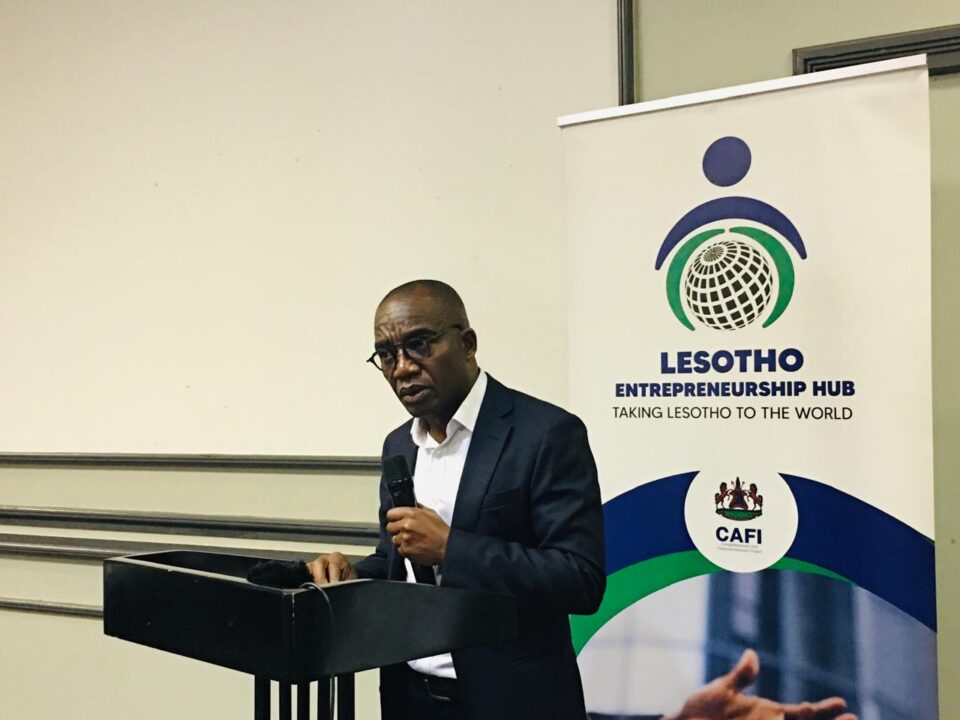Ithabeleng Qhasho
THE Ministry of Trade, Industry, and Business Development, through its Competitiveness and Financial Inclusion (CAFI) project, recently hosted a high-level media workshop to showcase the initiative’s key milestones and achievements since its 2022 launch.
The workshop engaged members of the media in critical discussions on the project’s impact on sustainable economic growth and private sector development in Lesotho.
CAFI Project Manager, Chaba Mokuku, explained that the project, which falls under the Ministry of Trade and is supported by the World Bank, aims to accelerate the implementation of key government policies.
He highlighted the project’s collaboration with multiple government ministries and institutions, including the Ministry of Agriculture and Food Security, the Ministry of Finance and Development with the Revenue Services Lesotho, the Central Bank of Lesotho, and the Ministry of Local Government, Chieftaincy, Home Affairs, and Police through the Maseru City Council (MCC).
Mr Mokuku emphasised that CAFI is anchored on three main pillars: improving the business environment, supporting entrepreneurship and MSMEs, and reviving the textile and horticulture industries.
“The project aligns with the National Strategic Development Plan (NSDP II), which runs until 2027. Its first key performance area is promoting inclusive and sustainable economic growth. Through CAFI, we are targeting priority sectors including manufacturing, agriculture, tourism, technology, the creative industry, and innovation,” Mr Mokuku said.
Under CAFI, several sub-projects are making significant strides.
The Lesotho Entrepreneurship Hub and Seed Financing Facility (LEHSFF), officially launched in June 2023, supports women and youth entrepreneurs through incubation, mentorship, and access to finance. Its goal is to make early-stage enterprises bankable and investor-ready, driving inclusive economic growth.
According to acting LEHSFF Manager, Mamoriti Phangoa, the hub has trained and supported 15 Entrepreneurship Support Organisations (ESOs), incubated up to 500 entrepreneurs with access to business tools and mentorship, invested in 50 innovative SMEs and startups, and launched one Venture Capital (VC) seed fund to finance promising new businesses. The hub has created a total of 1250 permanent and temporary jobs.
Ms Phangoa added that LEHSFF is also strengthening Lesotho’s regional entrepreneurship ecosystem and tapping into the Diaspora’s expertise and resources. The hub aims to develop a five-year strategic plan to ensure sustainability and long-term impact beyond the lifespan of the CAFI project.
Another key initiative under CAFI, the Lesotho Enterprise Assistance Program (LEAP), has outlined its Matching Grant Scheme, specifying eligible and non-eligible activities for funding support.
LEAP Manager, Lehlohonolo Chefa, explained that the scheme is designed to strengthen small businesses while ensuring funds are directed toward impactful development rather than recurring costs.
Eligible activities include skills development, product testing (standards compliance), selected equipment, and market access. However, grants cannot be used for salaries, rent, working capital, land, buildings, or investment attraction. LEAP also provides training in specialised fields such as welding, tourism product development, film, cosmetology, ICT, robotics, drones, and the Internet of Things.
“LEAP does not provide cash directly to businesses; instead, it purchases or secures the necessary resources on behalf of entrepreneurs. These restrictions ensure funds are channelled into sustainable, long-term improvements,” Mr Chefa said.
During the workshop, journalist Thabiso Kolotsana emphasised the importance of regular CAFI media engagements.
“Workshops like this are vital in spreading educational information to the public. LEAP, in particular, is one of the most important programmes I’ve learned about — it was my first time hearing about it,” Mr Kolotsana said.


